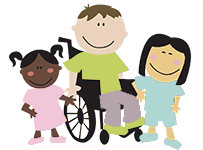[vc_row][vc_column][vc_column_text]Speech Apraxia, also known as Apraxia of speech, is when a child has difficulty with the proper movements necessary to form sounds. Although a child with speech Apraxia knows what they want or need to say, their brain’s ability to tell the proper muscles what to do when forming speech is interrupted.
How Do You Treat Speech Apraxia in Children?
 Apraxia of speech in children requires speech therapy for them to learn how to both plan and execute the movements needed to produce speech, in order to make speech more automatic or natural. After practicing movements repeatedly, your child will no longer need to think about the movements before they make them.
Apraxia of speech in children requires speech therapy for them to learn how to both plan and execute the movements needed to produce speech, in order to make speech more automatic or natural. After practicing movements repeatedly, your child will no longer need to think about the movements before they make them.
How Can I Help a Child with Speech Apraxia?
There are numerous ways you can help children with speech Apraxia, from hands-on learning activities to raising awareness. Here are ways that you can start helping your child with Apraxia of speech today.
- Take advantage of available resources.
There’s no reason to fumble through the process of adjusting along with your child with speech apraxia, especially when there are resources available to help with the transition. Informative websites include Speech and Language Kids and Apraxia Kids, the latter of which provides an extensive list of speech apraxia support groups.
- Take advantage of technology.
Both smartphones and tablets can be highly effective learning tools for children with speech apraxia because they can provide auditory and visual feedback to help your child learn how to form sounds. In addition, your child can hear their own sound productions for comparison. There are multiple apraxia apps are available to enhance your child’s journey to proper speech.
- Take advantage of your own speech abilities.
When it comes to everyday speech, you already know the ropes, so share that with your child repeatedly throughout the day by exaggerating speech movements that are causing them the most difficulty, as well as using finger placement on or near your face to indicate where their lips and tongue should be.
- Take advantage of your health.
It’s impossible to support a child through any difficult transition if you’re not healthy yourself. Take time to nurture your body and mind with regular exercise and relaxation methods such as yoga and meditation, and try to eat foods that will give you energy and clarity rather than weigh you down. In addition, make sure you’re getting an adequate amount of sleep. These are all practices that will keep your support strong for many years to come.
If you’re concerned about your child’s language and speech, please contact us at Speech and Occupational Therapy of Plano, Texas to schedule a consultation.[/vc_column_text][/vc_column][/vc_row]
